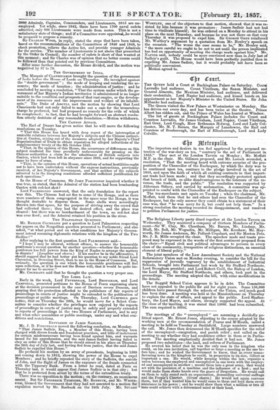THE NEAPOLITAN QUESTION.
Mr. BAILLIE COCHRANE put a question to Lord Palmerston respecting the papers on the Neapolitan question presented to Parliament ; and also asked, at what period and on what conditions her Majesty's Government intend resuming diplomatic relations with the kingdom of the Two Mollies ?"
After replying to the first question Lord PALMERSTON said " I hope I may be allowed, without offence, to answer the honourable gentleman's second question by another question—whether the honourable gentleman has full powers from the King of Naples to arrange the matters in dispute ? (Laughter and sheers.) If his answer be in the affirmative I should suggest that he had better put his question to my noble friend Lord Clarendon, in Downing Street, than to me in the House of Commons. But, seriously, the question is one which the honourable gentleman will feel upon reflection, or if he does not the House will, that it would be quite improper for me to answer." Mr. COCHRANE said that he thought the question a very proper one. THE LIEF.L Law.
Early in the week, Lord Fsvinisnam Lord BROUGHAM, and Lord CAMPBELL, presented petitions to the iouse of Peers expressing alarm at the decision pronounced in the case of Davison versus Duncan, and praying that the protection afforded to the publishers of fair reports of proceedings in courts of justice might be extended to the publication of proceedings at public meetings. On Thursday, Lord CAMPBELL gave notice' that on Thursday the 26th, he would move for a Select Committee to consider whether the privileges now enjoyed by the reports of proceedings in courts of justice may be safely and properly extended to reports of proceedings in the two Houses of Parliament, and to any and what other assemblies or public meetings, under any and what conditions and restrictions.


























 Previous page
Previous page